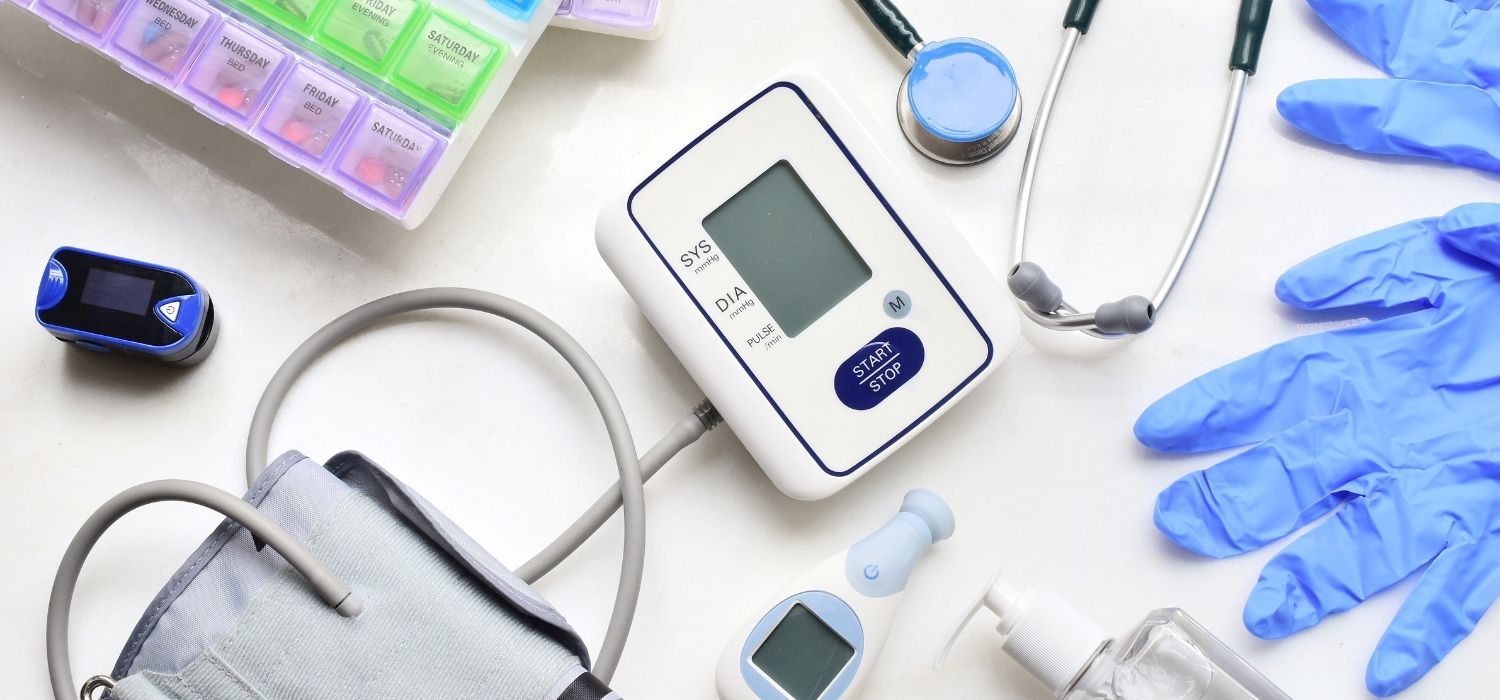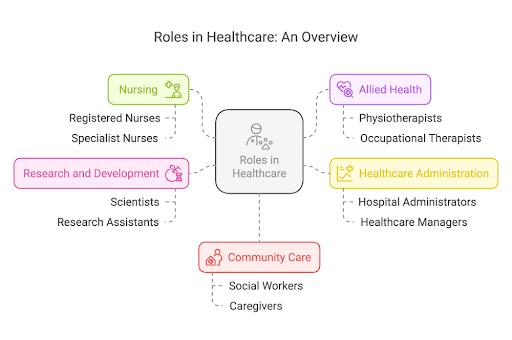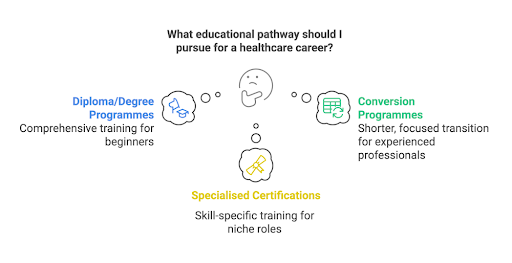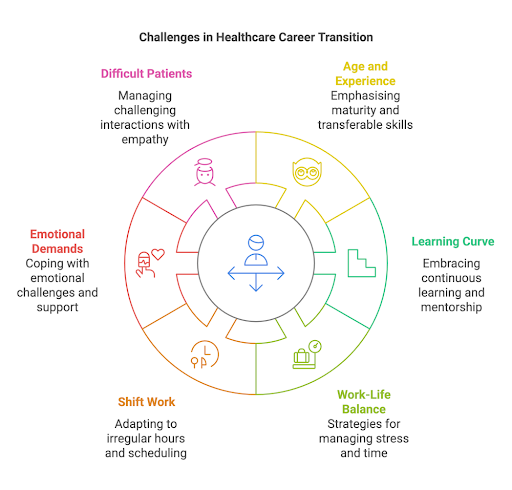Mid-Career Switch to Healthcare in Singapore
Considering a mid-career switch where you can make a real difference?

Mid-Career Switch to Healthcare
The healthcare sector in Singapore is a dynamic and growing field, which translates to plenty of opportunities for individuals looking for a career that’s both fulfilling and has a real impact. For mid-career professionals, making a switch to healthcare can be a rewarding move, allowing you to use your transferable skills and experience to make a difference in people's lives.
Consider this guide your roadmap if you’re thinking about a mid-career change to healthcare, even if you have no experience in the industry. We’ll also explore how to get a job in healthcare with the right preparation and resources.
Exploring a Healthcare Career
The first step in your mid-career switch to healthcare is to explore the diverse landscape of healthcare roles. Understanding these different paths and figuring out what genuinely interests you is crucial for a successful and fulfilling transition.
Singapore's Healthcare Landscape
Singapore boasts a well-developed and comprehensive healthcare system, with both public and private sectors playing crucial roles. If you’re thinking about a mid-career switch to healthcare, getting a grasp of this landscape is essential. Key institutions include:
- Ministry of Health: (MOH): The government agency responsible for formulating and implementing national health policies, overseeing public healthcare institutions, and promoting public health initiatives.
Public Hospitals: Provide a wide range of healthcare services, including acute care, specialised treatments, and community healthcare.
Private Hospitals: Offer a range of services, from general medical care to specialised treatments, often with a focus on personalised care and advanced technologies.
Polyclinics: Community-based healthcare centres providing primary care services, such as general consultations, basic medical procedures, and health screening.
- Community Health Centres: Offer a range of community-based services, including health promotion, disease prevention, and home-based care for the elderly and vulnerable.
Familiarising yourself with the structure and key players in Singapore's healthcare landscape will be beneficial as you start your job search and navigate your career transition.
Diverse Roles in Healthcare

If you’re wondering how to get into healthcare with no experience, here are some roles to consider for your mid-career change to healthcare:
Nursing: At the heart of patient care, nurses provide direct support, administer medications, educate patients and families, and play a vital role in ensuring well-being. Nursing roles vary in responsibility and specialisation, including registered nurses, enrolled nurses, and specialist nurses with expertise in areas like critical care, oncology, or paediatrics.
Allied Health: This dynamic field encompasses a broad spectrum of professions dedicated to patient care and rehabilitation. Allied health professionals work collaboratively with doctors and nurses to provide specialised services. Roles include physiotherapists, occupational therapists, speech therapists, medical social workers, dieticians, radiographers, and many others.
Healthcare Administration: Behind the scenes, healthcare administrators ensure the smooth operation of hospitals, clinics, and other healthcare organisations. They manage resources, oversee finances, implement policies, and ensure efficient service delivery. Roles include hospital administrators, healthcare managers, health informatics specialists, and professionals in finance, human resources, and operations.
Research and Development: For those with a scientific background and a passion for discovery, healthcare research offers exciting opportunities. Roles include scientists, research assistants, clinical trial coordinators, and those involved in developing new treatments and technologies.
Community Care: Beyond hospital walls, community care focuses on providing support and services to individuals within their communities. Social workers, caregivers, counsellors, and home healthcare professionals work with diverse populations, addressing social, emotional, and health needs within the community setting.
Matching Skills and Interests
Identifying the right healthcare career path for your mid-career switch requires self-reflection and research. Consider your strengths, interests, and values. What kind of work environment do you thrive in? Do you prefer direct patient interaction or working behind the scenes? What are your career goals and aspirations?
Alternatively, you can utilise professional resources to gain further insights. For instance, professional associations, job portals, informational interviews with healthcare professionals, and career consulting services can provide valuable information and guidance.
Preparing for the Transition
A successful mid-career switch to healthcare often requires additional education, licensing, and practical experience. Here’s how you can prepare for the transition.
Education and Training

The educational pathways for different healthcare roles vary. Here are some common options:
Diploma and Degree Programmes: Polytechnics and universities in Singapore offer diploma and degree programmes in nursing, allied health, and other healthcare disciplines. These programmes provide comprehensive training and are suitable for individuals with no prior healthcare experience.
Conversion Programmes: Professionals with relevant experience may be eligible for conversion programmes, which are typically shorter and more focused than full-degree programmes. For example, the Career Conversion Programme for Allied Health Professionals facilitates transitions into roles like occupational therapy and physiotherapy, while Career Conversion Programmes for Nurses supports individuals with science backgrounds to become nurses.
Specialised Certifications and Training Courses: These can equip you with specific skills needed for certain roles, such as phlebotomy, medical coding, or healthcare management. SkillsFuture Singapore (SSG) offers various initiatives and funding support for individuals seeking digital upskilling courses for healthcare careers. Explore the MySkillsFuture for more information on available programmes and funding opportunities.
Licensing and Registration
Many healthcare professions in Singapore require licensing or registration with relevant regulatory bodies to ensure professional standards and patient safety. For example, nurses need to be registered with the Singapore Nursing Board (SNB), while allied health professionals need to be registered with the Allied Health Professions Council (AHPC). Research the specific licensing requirements for your chosen profession and ensure you meet the criteria before applying for jobs.
Gaining Experience
While getting the right qualifications and licenses is a must, getting some real-world experience under your belt can boost your chances when you’re making a mid-career switch to healthcare. Consider these options:
Volunteering: Volunteering at hospitals, clinics, or community healthcare organisations provides valuable exposure to the healthcare environment and allows you to develop relevant skills and build your network.
Shadowing: Shadowing healthcare professionals in their daily work can offer firsthand insights into different roles and responsibilities, helping you make informed career choices.
Internships or Part-time Roles: Taking on internships or part-time roles in the healthcare sector can provide practical experience and strengthen your resume.
Navigating Job Search
Once you've gained the necessary skills and knowledge, it's time to actively pursue your healthcare career goals. Here's how to get into healthcare with no experience and navigate the job search effectively:
Tailoring Your Resume and Cover Letter
When applying for healthcare positions, tailor your resume and cover letter to highlight your transferable skills and relevant experience. Emphasise your passion for healthcare, your commitment to making a difference, and any volunteer work or internships you've undertaken. Use keywords relevant to the specific role and healthcare sector you're targeting. This will help you stand out as a strong candidate, even if you're making a mid-career change to healthcare.
Networking and Building Connections
Networking for a job in healthcare is also crucial, especially for those making a mid-career switch. Attend healthcare job fairs and networking events, and connect with healthcare professionals on LinkedIn and other professional platforms. Reach out to healthcare recruiters and staffing agencies for potential job opportunities and career advice.
Interview Preparation
Thorough interview preparation is key for making a positive impression and demonstrating that you’re a good fit. Here's how to approach your interview preparation:
Research the Institution: Gain a deep understanding of the healthcare institution you're interviewing with. Research their mission, values, recent initiatives, and any specialised departments or services they offer. This knowledge will help you tailor your answers and demonstrate your genuine interest in the organisation.
Practice Answering Common Interview Questions: Prepare for common interview questions related to your motivation, skills, experience, and understanding of healthcare. Practise articulating your answers clearly and concisely, highlighting your strengths and transferable skills. Here are some examples of common interview questions for healthcare roles:
Why are you interested in a career in healthcare?
What are your strengths and weaknesses?
Tell me about a time when you had to deal with a difficult situation or a challenging individual.
What are your thoughts on the current healthcare landscape in Singapore?
Why are you interested in working for our organisation specifically?
Prepare Thoughtful Questions: Asking insightful questions demonstrates your engagement and interest in the role and the organisation. Prepare questions about the team dynamics, opportunities for professional development, the organisation's culture, and any specific challenges facing the department or institution.
Challenges of Healthcare Industry
While a mid-career switch to healthcare can be fulfilling, be aware of potential challenges and be ready to address them proactively.

Age and Experience
Some mid-career switchers may have concerns about their age or lack of direct healthcare experience. If you’re struggling with the same issues, know that maturity, life experience, and transferable skills from previous careers can be valuable assets in healthcare. Highlight these strengths during your job search and interviews, emphasising how your diverse background can contribute to the healthcare team.
Learning Curve
Adapting to a new industry and learning new skills can be challenging, especially during a mid-career change to healthcare. Be prepared to embrace continuous learning and professional development opportunities to keep up with the latest healthcare practices and advancements. Seek out mentors and colleagues who can support your learning journey.
Work-Life Balance
Many healthcare roles can be demanding, requiring long hours, shift work, and emotional resilience. It's extremely important that you prioritise your well-being and maintain a healthy work-life balance. Develop strategies for managing stress, such as exercise, mindfulness, and spending time with loved ones.
Other Challenges
Shift Work: Be prepared for the possibility of shift work, including nights, weekends, and public holidays. This is common in many healthcare roles, particularly in hospitals and emergency services. Consider how this might impact your personal life and commitments, and develop effective strategies for managing your time and energy.
Emotional Demands: Dealing with illness, suffering, and death can be emotionally challenging. Healthcare professionals often witness difficult situations and interact with patients and families experiencing distress. It's crucial to develop healthy coping mechanisms to manage these emotional demands. Some strategies include:
Mindfulness and Self-Care Practices: Engage in activities that promote relaxation and emotional well-being, such as meditation, yoga, or spending time in nature.
Seeking Support from Colleagues and Mentors: Talk to experienced healthcare professionals about their experiences and learn from their coping strategies.
Establishing Boundaries: Learn to separate your work and personal life to avoid emotional burnout.
Seeking Professional Help when Needed: Don't hesitate to reach out to a therapist or counsellor if you're struggling to cope with the emotional demands of your role.
Difficult Patients: You may encounter demanding, uncooperative, or abusive patients. These interactions can be challenging and require patience, empathy, and strong communication skills. Some strategies for managing difficult interactions include:
Active Listening: Pay attention to the patient's concerns and try to understand their perspective.
Clear Communication: Communicate clearly and respectfully, setting boundaries as needed.
Empathy and Compassion: Even in challenging situations, strive to maintain empathy and compassion for the patient's situation.
Seeking Assistance from Colleagues or Supervisors: If a situation escalates, don't hesitate to seek assistance from your colleagues or supervisors.
Embrace Lifelong Learning for a Successful Transition
A mid-career switch to healthcare is a big move that takes some thought, getting ready, and willingness to keep learning. By understanding the diverse roles available, acquiring the necessary skills and qualifications, and actively putting yourself out there, you can boost you can increase your chances of success.
Lifelong Learning SG (LLSG) is here to help you out along the way. Join us at our upcoming Care Economy Jobs & Skills Fair where you'll gain exciting insights into the Healthcare, Early Childhood, and Community Care sectors. Don't miss out on the chance to get personalised training advice and explore real job openings!
Posted on 7/21/2025 12:00:00 AM